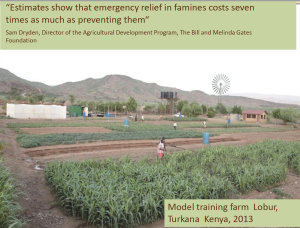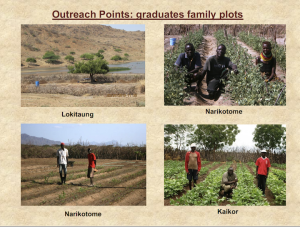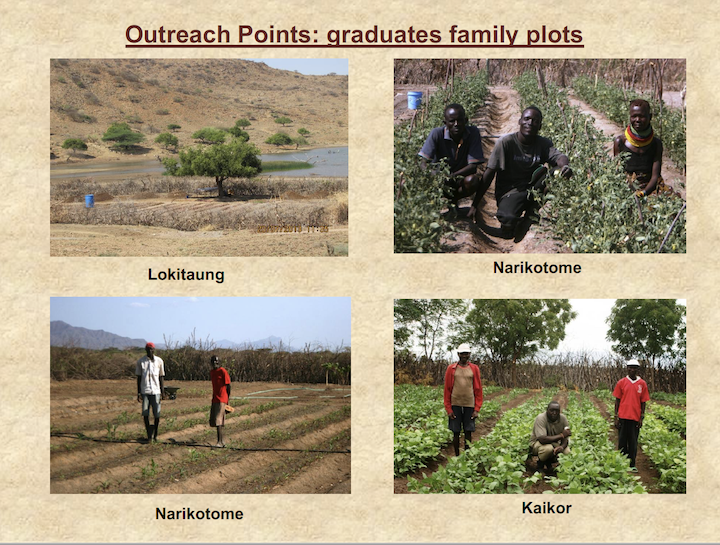By Felix Kimani Kariuki, ESRAG Director and Africa Chapter Co-Chair

Slides are from Felix Kimani Kariuki’s power point presentation on the “Furrows in the Desert” project.
The arid and semi-arid lands (ASALs) in Kenya account for 88% of the total land mass and host 35% of the country’s population. The region covers 23 counties and is characterized by harsh climatic conditions, significant environmental degradation, water scarcity, and conflict over access to resources (land, pasture, and water) resulting from prolonged droughts. The region is particularly vulnerable to food insecurity, affecting millions primarily dependent on pastoralism and small-scale farming. It is estimated that at any one time, about two million people living in Kenya’s ASAL regions require food assistance – and the number doubles during periods of drought.
In 2022, the Horn of Africa region, which forms part of the Rotary District 9212, experienced one of the worst droughts in recent history due to the failure of four consecutive rainy seasons. Rotary – just as in previous drought events – partnered with the government of Kenya and other stakeholders to support food relief interventions in the affected areas.
Even though food aid interventions are life-saving actions, they are often not sustainable as they do not address the complex food insecurity challenges. Since 2013, the Rotary District 9212, through the Rotary Club of Muthaiga, has partnered with Rotary District 2490 in Israel, to implement a sustainable food security project, with the aim of improving small-scale farmers’ livelihoods through the promotion of regenerative agriculture practices as depicted in the movie “Kiss the Ground” on the Loess Plateau, where 14,000 square miles of desertification was recovered over a period of 14 years.
Now, we’re encouraging communities across the region to sign up to host outdoor screenings of “Kiss the Ground” to inspire the widest possible adoption of regenerative farming practices that will help restore food security to these damaged lands. If you live in Kenya’s ASALs and can host a screening, please sign up here. We’re part of an international challenge to set up 1,000 outdoor screenings of this inspiring film.
 Our pilot project, titled: Furrows in the Desert, aimed to support small-scale farming to improve food production and food security in the area, and contribute to local community resilience through income-generating activities and marketing of agricultural products. The project had three integral activities, including
Our pilot project, titled: Furrows in the Desert, aimed to support small-scale farming to improve food production and food security in the area, and contribute to local community resilience through income-generating activities and marketing of agricultural products. The project had three integral activities, including
- Training of 610 farmers from 50 communities in adaptable agricultural methods for arid lands
- Water infrastructure development, i.e., installation of appropriate water distribution infrastructure and gravity-fed drip irrigation systems; and
- On-site agronomic support and monitoring of farmers.
During the last 10 years of the project implementation, the following lessons were captured:
- There is evidence that local food production contributes to the improved nutritional status of communities in ASAL areas, which supports socioeconomic resilience in these communities.
- The project has shown that it is possible to adapt climate-smart agricultural methods for growing a large variety of crops and sustain self-subsistent and commercial agriculture in ASAL areas.
- Appropriate training and in-the-field long-term guidance are necessary for the sustainable implementation of agricultural interventions in predominantly pastoral communities.
Following the positive outcomes from this project demonstrated over a period of ten years, Rotary District 9212 seeks to scale up integrated livelihood interventions to address food security challenges in Kenya’s ASAL areas, through the Rotary Program of Scale. Scaling this project will benefit more communities affected by perennial drought in the ASALs. It will also provide an opportunity to implement large-scale, high-impact programs touching on various areas of focus, including:
- Community Economic Development
- Environmental Sustainability
- Water and Sanitation
- Peace and Conflict Resolution
- Disease Prevention and Treatment.
Activity Objective
The primary objective of Kiss the Ground open screenings is to scale up sustainable livelihood interventions to improve food security and nutrition resilience in communities living in arid and semi-arid areas of Kenya.
Specifically, the activity aims to:
- Increase food security in the ASAL region by promoting climate-smart agricultural and livestock management practices, including agroforestry, and promotion of drought-tolerant crops
- Strengthen nutrition resilience and reduce malnutrition through livelihood diversification
- Enhance environmental restoration efforts that promote sustainable use of natural resources
- Strengthen partnerships with local government and community-based institutions to ensure the sustainability and institutionalization of regenerative agriculture.
Approach
Kiss the Ground open screening training will be implemented over a 2-month period, and will engage 14,000 farmers through 70 Farmers’ Associations and Cooperatives within a radius of 410 miles from Nairobi.
Expected Results
The proposed activity will contribute to global and national efforts through the implementation of comprehensive and integrated food security and nutrition interventions in arid and semi-arid areas of Kenya. The activity will enhance the resilience of communities to climate-related shocks and stresses, leading to improved livelihoods and food security in the long term. In broader terms, the outcomes will contribute to the achievement of the Sustainable Development Goals on poverty reduction, food security, water and sanitation, environmental sustainability, and climate action.
I will leverage partnerships with local organizations and county governments to ensure sustainability and long-term impact. Lessons learned from this activity will be shared with other government agencies, NGOs, and the private sector for replication and scaling up in other drought-prone regions of the country.
Felix Kimani Kariuki is a Kenyan agronomist, ESRAG Director, and co-chair of ESRAG’s Africa Chapter. You can reach him by email.

